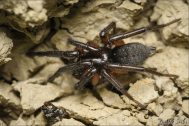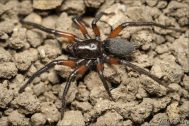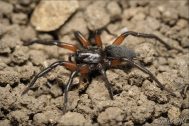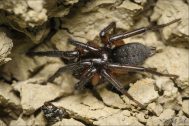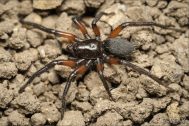| Records by time | |||||
|---|---|---|---|---|---|
| Gnaphosidae | 0-1900 | 1901-1950 | 1951-2000 | 2001+ | ∑ |
| Gnaphosa modestior Kulczyński, 1897 Criticaly endangered | 8× | 8× | |||
Gnaphosa modestior Kulczyński, 1897
| Czech name | skálovka panonská |
|---|---|
| Threat level | Criticaly endangered |
| Records | 8 nálezů, 5 kvadrátů |
| Last record | 2023 , Eva Líznarová |
| Phytogeographic area | - |
| Původnost stanovišť | - |
| Humidity | - |
| Stratum | - |
| Osvětlení stanovišť | - |
| Hojnost výskytu |
|
| Altitude | 150-300 |
Bibliography
Výsledky faunistického průzkumu pavouků a sekáčů na vybraných lokalitách na území NP Podyjí v roce 2019
A total of 114 spider species from 25 families and one harvestmen species were found during the zoological research at several sites in the Podyjí National Park during 2019. Of them, forty-one species are listed in the Red List of spiders of the Czech Republic. Four new species for the Podyjí NP were recorded – Callilepis nocturna (Linnaeus, 1758), Euryopis laeta (Westring, 1861), Phrurolithus minimus C. L. Koch, 1839 and Trichoncus auritus (L. Koch, 1869). Among the most interesting species, four critically endangered spiders – Civizelotes caucasius (L. Koch, 1866), Phrurolithus szilyi Herman, 1879, Gnaphosa modestior Kulczyński, 1897 and Eresus moravicus Řezáč, 2008 should be mentioned. Other rare species include Acartauchenius scurrilis (O. Pickard-Cambridge, 1873), Agyneta fuscipalpa (C. L. Koch, 1836), Arctosa figurata (Simon, 1876), Atypus affinis Eichwald, 1830, Bassaniodes robustus (Hahn, 1832), Callilepis schuszteri (Herman, 1879), Centromerus incilium (L. Koch, 1881), Centromerus leruthi Fage, 1933, Cheiracanthium effossum Herman, 1879, Drassyllus villicus (Thorell, 1875), Euryopis quinqueguttata Thorell, 1875, Frontinellina frutetorum (C. L. Koch, 1835), Gibbaranea gibbosa (Walckenaer, 1802), Gnaphosa opaca Herman, 1879, Haplodrassus cognatus (Westring, 1861), Haplodrassus dalmatensis (L. Koch, 1866), Haplodrassus minor (O. Pickard-Cambridge, 1879), Heterotheridion nigrovariegatum (Simon, 1873), Kishidaia conspicua (L. Koch, 1866), Leptorchestes berolinensis (C. L. Koch, 1846), Minicia marginella (Wider, 1834), Phrurolithus pullatus Kulczyński, 1897, Trichopterna cito (O. Pickard-Cambridge, 1873), Walckenaeria simplex Chyzer, 1894, Zelotes erebeus (Thorell, 1871) and Zora manicata Simon, 1878.Výsledky faunistického průzkumu pavouků a sekáčů na vybraných lokalitách na území NP Podyjí v roce 2019
A total of 114 spider species from 25 families and one harvestmen species were found during the zoological research at several sites in the Podyjí National Park during 2019. Of them, forty-one species are listed in the Red List of spiders of the Czech Republic. Four new species for the Podyjí NP were recorded – Callilepis nocturna (Linnaeus, 1758), Euryopis laeta (Westring, 1861), Phrurolithus minimus C. L. Koch, 1839 and Trichoncus auritus (L. Koch, 1869). Among the most interesting species, four critically endangered spiders – Civizelotes caucasius (L. Koch, 1866), Phrurolithus szilyi Herman, 1879, Gnaphosa modestior Kulczyński, 1897 and Eresus moravicus Řezáč, 2008 should be mentioned. Other rare species include Acartauchenius scurrilis (O. Pickard-Cambridge, 1873), Agyneta fuscipalpa (C. L. Koch, 1836), Arctosa figurata (Simon, 1876), Atypus affinis Eichwald, 1830, Bassaniodes robustus (Hahn, 1832), Callilepis schuszteri (Herman, 1879), Centromerus incilium (L. Koch, 1881), Centromerus leruthi Fage, 1933, Cheiracanthium effossum Herman, 1879, Drassyllus villicus (Thorell, 1875), Euryopis quinqueguttata Thorell, 1875, Frontinellina frutetorum (C. L. Koch, 1835), Gibbaranea gibbosa (Walckenaer, 1802), Gnaphosa opaca Herman, 1879, Haplodrassus cognatus (Westring, 1861), Haplodrassus dalmatensis (L. Koch, 1866), Haplodrassus minor (O. Pickard-Cambridge, 1879), Heterotheridion nigrovariegatum (Simon, 1873), Kishidaia conspicua (L. Koch, 1866), Leptorchestes berolinensis (C. L. Koch, 1846), Minicia marginella (Wider, 1834), Phrurolithus pullatus Kulczyński, 1897, Trichopterna cito (O. Pickard-Cambridge, 1873), Walckenaeria simplex Chyzer, 1894, Zelotes erebeus (Thorell, 1871) and Zora manicata Simon, 1878.European species of the Gnaphosa alpica complex (Araneae, Gnaphosidae).
Members of the genus Gnaphosa belong to the largest gnaphosid spiders. They are particularly interesting in nature conservation as their distribution is mainly restricted to disappearing natural non-forest habitats. In Europe, several Gnaphosa species groups occur. The exclusively Palaearctic group G. bicolor is characterised by a retrolaterally-shifted embolus, which occupies at least part of the middle one-third of the palpal bulb; females have laterally expanded epigyne and often have very elongated median epigynal ducts (Ovtsharenko et al. 1992). So far four species of this group have been identified in Europe, with a fifth species found in Central Asia (G. tarabaevi Ovtsharenko, Platnick & Song, 1992). Two of the European species, G. bicolor (Hahn, 1831) and G. badia (L. Koch, 1866), are well known and their taxonomy and nomenclature is stable, but the same does not hold true for the other two.
The taxonomy and nomenclature of the rare European gnaphosid spiders Gnaphosa alpica and Gnaphosa modestior have been confused. Simon (1878) first described females of G. alpica from southwestern Alps. Almost twenty years later, Władysław Kulczyński described two more species, Gnaphosa modestior (single male from northeastern Croatia, and females from central Hungary and southwestern Romania) and G. laeta (single female from northeastern Hungary) (Chyzer & Kulczyński 1897), however the author expressed doubts about the species status of G. laeta and suggested that it may be an abberant female Gnaphosa modestior. Ovtsharenko et al. (1992) later published a review of the north Asian Gnaphosa, including the species from Europe, in which they come to incorrect conclusions regarding the identities of the three aforementioned species/names due to a lack of available material. Recently, we were given the opportunity to review this group of species through the study of new material. We redescribe Gnaphosa modestior and G. alpica (including designation of the lectotype and first description of a male) and describe a new, closely related species G. dolanskyi sp. n. from the southeastern Europe and adjacent regions of Asia. Further, we remove G. laeta from synonymy of G. alpica and suggest it to be a synonym of Gnaphosa modestior.Gallery
Statistics
By month
By altitude
By collecting method (8 used records)
| Gnaphosa modestior Kulczyński, 1897 CR | Males | Females | Juveniles | Records |
|---|---|---|---|---|
| Zemní past | 21 | 6 | 0 | 7 |
| Individuální sběr | 0 | 1 | 0 | 1 |
| Males | Females | Juveniles | Records |
By biotope (7 used records)
| Gnaphosa modestior Kulczyński, 1897 CR | Males | Females | Juveniles | Records |
|---|---|---|---|---|
| Neurčeno | 17 | 5 | 0 | 5 |
| Ruderály | 0 | 1 | 0 | 1 |
| Xerotermní travinobylinná společenstva | 1 | 0 | 0 | 1 |
| Males | Females | Juveniles | Records |



